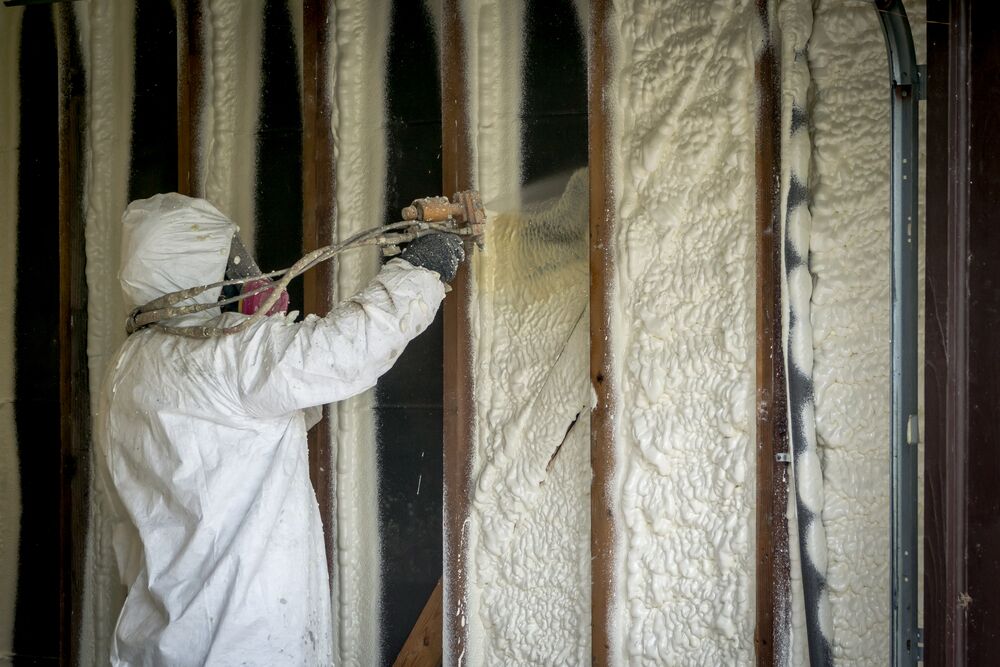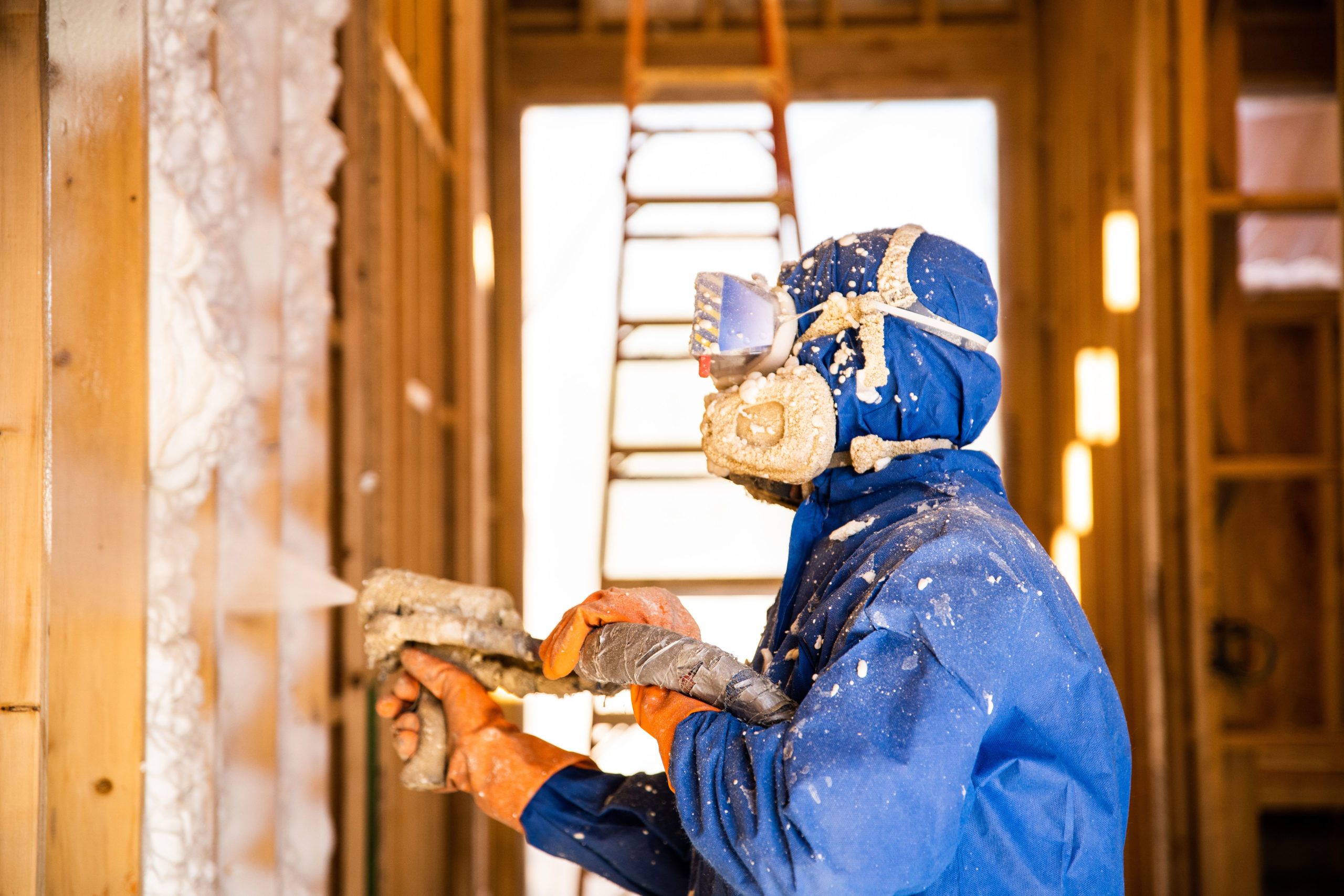Tips for Preserving Your Spray Foam Insulation for Long-Term Efficiency
Spray Foam: The Ultimate Service for Air Sealing and Insulation
Spray foam insulation has actually arised as a leading service for reliable air sealing and thermal insulation, offering a distinct combination of residential properties that set it apart from conventional approaches. Understanding the full extent of its advantages, installment procedures, and contrasts with various other insulation kinds is crucial for making informed decisions.
What Is Spray Foam?
Spray foam is a versatile insulation material that incorporates the concepts of air securing and thermal resistance to enhance energy effectiveness in buildings. Made up primarily of polyurethane or other comparable substances, spray foam is applied as a fluid that expands upon contact with surfaces, producing a solid, continual layer of insulation. This one-of-a-kind property permits it to fill voids, cracks, and spaces that traditional insulation products may neglect, providing a superior air seal.
There are two main sorts of spray foam: open-cell and closed-cell. Open-cell spray foam is lighter and extra versatile, supplying excellent noise absorption and a lower R-value per inch - Spray Foam. In comparison, closed-cell spray foam is denser, offering a greater R-value, wetness resistance, and added architectural honesty to building parts
The application process normally involves specialized devices, guaranteeing a smooth application that adheres to different substrates, consisting of concrete, metal, and timber. This versatility makes spray foam ideal for both new buildings and retrofitting existing frameworks. Its ability to produce an impermeable barrier substantially adds to minimizing energy intake and enhancing interior air high quality, thereby making it a recommended selection amongst homeowners and home builders alike.
Benefits of Spray Foam Insulation
One of one of the most substantial advantages of spray foam insulation is its extraordinary capability to create a continuous air obstacle, which properly reduces power loss. Unlike typical insulation materials, spray foam expands to fill fractures and spaces, guaranteeing that air leak is significantly lowered. This particular not just enhances power performance however likewise brings about reduce energy costs over time.
Additionally, spray foam insulation supplies premium thermal resistance, contributing to a much more stable interior environment. Its high R-value per inch enables reliable insulation in confined spaces, making it optimal for attic rooms, wall surfaces, and crawl spaces. Additionally, the moisture-resistant residential or commercial properties of spray foam assistance prevent mold and mildew and mildew growth, advertising healthier living conditions.
Another important benefit of spray foam insulation is its sound-dampening high qualities (Spray Foam). It properly lowers sound transmission in between areas, creating a quieter and more comfortable home setting. The durability of spray foam additionally sticks out, as it does not droop or clear up in time, preserving its efficiency throughout its lifespan
Exactly How Spray Foam Functions
Recognizing exactly how spray foam insulation functions is crucial for valuing its performance in air sealing and thermal resistance. Spray foam insulation includes 2 main components: isocyanate and polyol material. When these parts are mixed, they undergo a chain reaction that creates the material to increase quickly, creating a thick foam that fills up splits, gaps, and dental caries.
As the foam expands, it sticks to surface areas, developing an airtight seal that significantly minimizes air infiltration. This particular makes spray foam insulation highly reliable at preventing drafts and wetness penetration, which can result in energy loss and damage with time. Additionally, the closed-cell variation of spray foam supplies premium thermal resistance due to its rigid structure, successfully reducing warmth transfer.
The one-of-a-kind residential or commercial properties of spray foam allow it to adhere to uneven surfaces, making certain comprehensive coverage and a smooth barrier. Therefore, spray foam insulation not just improves energy efficiency however likewise contributes to boosted interior air high quality by minimizing the buildup of pollutants and allergens. Ultimately, comprehending the auto mechanics behind spray foam underscores its role as a premium selection for insulation and air securing in both commercial and property applications.
Installment Refine Introduction

Before installation, the room needs to be adequately cleansed and prepped, making sure that surfaces are without moisture, dirt, and debris. Because image source contaminants can endanger attachment and total performance, this step is essential. Once the area is prepared, the application entails blending both elements of the spray foam, which increases upon call and fills voids properly.
Trained experts need to conduct the installment, utilizing customized equipment to guarantee news consistent insurance coverage and optimal density. Safety and security precautions, including putting on protective equipment and guaranteeing proper ventilation, are crucial throughout this procedure. After application, the foam normally treatments swiftly, forming a strong barrier that boosts energy efficiency.
Comparing Spray Foam to Conventional Insulation
When examining insulation options, spray foam insulation stands out in contrast to typical materials such as fiberglass and cellulose. Unlike fiberglass and cellulose, which can permit air infiltration, spray foam increases upon application, filling holes and voids to create an airtight seal.
Furthermore, spray foam gives a higher R-value per inch than standard insulation types, supplying even more effective thermal resistance in a thinner account. This particular is particularly useful in rooms with limited tooth cavity depth. Furthermore, spray foam is immune to moisture and mold development, which can be a significant interest in cellulose and fiberglass, particularly in humid environments.
Nonetheless, spray foam insulation commonly brings a higher ahead of time expense than its typical equivalents. Property owners have to weigh this first investment against lasting energy cost savings and performance advantages. Eventually, while both insulation kinds serve their purpose, spray foam emerges as an advanced service for modern-day insulation demands, specifically in terms of air sealing and thermal efficiency.

Final Thought
In summary, spray foam insulation stands for a very effective remedy for accomplishing ideal air securing and thermal resistance. Its unique buildings, consisting of wetness resistance and audio dampening, make it suitable for numerous applications in both brand-new buildings and retrofitting tasks (Spray Foam). Although the first expenses might be greater contrasted to conventional insulation materials, the try this web-site lasting benefits, such as significant energy cost savings and enhanced indoor air quality, justify the investment and emphasize its value in modern-day structure methods.
Spray foam insulation has emerged as a leading solution for effective air securing and thermal insulation, providing a special combination of buildings that set it apart from traditional techniques.Spray foam is a functional insulation product that integrates the principles of air sealing and thermal resistance to enhance energy performance in buildings.When reviewing insulation choices, spray foam insulation stands out in comparison to typical materials such as fiberglass and cellulose. Ultimately, while both insulation kinds offer their purpose, spray foam arises as a much more innovative service for contemporary insulation requirements, especially in terms of air securing and thermal effectiveness.
In recap, spray foam insulation stands for a very efficient option for achieving optimal air securing and thermal resistance.